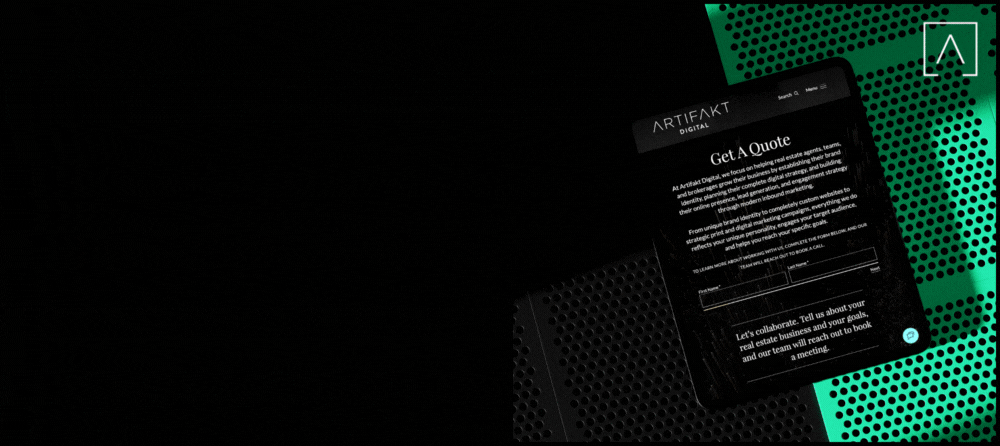Real Estate Marketing Strategies to Embrace in 2025

Your marketing strategy is never finished. To see continued success in your marketing efforts, you have to periodically look at what you’re doing, determine what’s working and what isn’t working, and introduce change accordingly.
Sometimes you might need to make bigger changes, like completely overhauling your entire marketing strategy or going all in on digital (when maybe you’ve never done that before), or you might need to make smaller changes, like introducing a new advertising campaign or updating your logo and branding, but no matter what changes you make, know that change should continually be happening.
After all, continued investment in your marketing strategy is continued investment in your business.
As you plan for 2025, here are some of the things you might want to consider building into your own overall marketing strategy.
Planning Your Search Strategy For SEO, AEO, and AI
In 2025, it’s more important than ever before to continue to develop a solid Search Engine Optimization (SEO) strategy so you can show up at the right time, in the right places, for the right people, searches, and reasons; and while planning for search as part of your marketing strategy shouldn’t be anything new, with all of the advancements in AI over the past year, parts of the where and how to show up in search are new (and should be taken into account as part of your overall SEO strategy).
While in the last year, it’s become increasingly more common for people to use AI multiple times per day to complete tasks, it’s also becoming more popular to use AI to perform searches and to be treated as an actual search engine, especially with the recent updates around Google Gemini, Google Generative Search, and the introduction of OpenAI’s SearchGPT.
The key to planning for, and seeing success in, those AI-based searches is to adopt an Answers Engine Strategy (AEO) into your existing SEO strategy.
An AEO strategy is comprised of building an answer-based content strategy that works towards directly solving problems for people by answering their questions, and then optimizing that content as part of your SEO strategy, with the goal of creating content that’s more crawl-able by, and discoverable in, AI-based searches.
A successful AEO strategy, built on an already strong SEO strategy, starts with a well-planned and well-researched content strategy, focusing on useful, answer-based content, written in a question-based format: for example, content like “what to know when selling your home in a divorce?” or “should you sell your home before buying a new one?” (ideally as part of a large content strategy)..
In response to questions like the examples above, most AI-based search engines will provide a long-form written answer with source credits to the websites that inspired the generated content (which is where you want your website to ideally show up); and your best chance of showing up as those source credits is by producing content that directly answers those questions, and properly optimizing them.
In 2025, having a strong AEO strategy in place to key to your audience finding you for the right reasons, in these new places that they’re searching.
★ Want to learn more about planning for SEO and AEO? Have a look at these posts and resources:
- Building an Answers Engine Optimization (AEO) Strategy for AI
- Does Using AI-Generated Content Negatively Affect Your SEO Strategy?
- Building a Well-Rounded SEO Search Strategy for Your Real Estate Website
- How Being Authoritative Can Bring You More Quality Website Traffic
- Download Our SEO Strategy Building Guide for Real Estate Agents
Utilizing AI for More Personalized Marketing
In 2025, building marketing relationships is more important and effective than ever when it comes to seeing success in your marketing strategy, and one of the best ways to do that is by making sure your marketing feels specific and personalized.
Building personalization into your marketing strategy is a key part of establishing trust with your target audience, showing them you care and you’re here to help, and eventually, turning them into clients because of your effort.
Effective personalization means making someone feel like your marketing was created just for them; and that goes far beyond just addressing them by name (which you should of course); and in 2025, with the help of AI and an up-to-date, modern CRM, building more personalization into your marketing is more effortless (and effective) than ever.
When set up correctly, AI can help you by doing a lot of the work around making sure your audience receives the right marketing material information, that feels more personally created for them, and at a time when it’s likely to be the most relevant to them and their needs.
That’s because AI works to understand your contact database, and identify the actions that will be most effective to take with them, in a way that would take too much time, and be less effective, if done by a human alone. For example, through the combination of AI, your CRM, and automations, you can send the potential sellers within your sales funnel, local market information, specific to them, in and around the time that they’re most likely to think about selling.
The more you can make someone feel like something was created specifically for them, the more likely you’ll build a meaningful marketing relationship with them, and the more likely they’ll choose to work with you; and in the new year, with the help of AI, that will be more effective and important than ever.
★ Want to learn a bit more about personalized marketing, and using AI to do it? Have a look at these posts:
- Using AI to Build a Personalized Real Estate Marketing Strategy
- Using Personalized Marketing to Get Better Engagement (and Leads)
- Why Personal, Targeted Marketing Means Better Real Estate Leads
Taking a Solutions-Based Approach to Marketing
For most agents, talking about their successes is a big part of their marketing strategy and their overall marketing message. And why wouldn’t it be? It’s a fairly common strategy that agents have used for a long time and have seen results with. Whether it’s how many properties they’ve sold or what awards they’ve won, a lot of agents focus on highlighting why they’re better or more experienced than their competitors.
A lot of people will respond to that type of messaging, and even choose an agent based on how successful they are. But in an increasingly competitive business like real estate, if you’re a newer agent without much experience to highlight, or even if you’ve been an agent for decades and simply want to find a new way to build more qualified leads, there’s another approach that people will respond to in 2025 more than ever: and that’s by implementing a solutions-based marketing strategy.
A solutions-based marketing strategy is where you focus on addressing how a person’s pain point is solved.
Solutions-based marketing is all about focusing on the person you’re trying to reach, rather than on yourself and your accomplishments. And for an agent, there’s no shortage of problems you can solve for people that are within you target audience. You can even attract the types of leads you want, based on the solutions you’re providing.
The key to solutions-based marketing is to make sure your offering clearly solves a problem for your target audience. For example:
- If you want to work with busy, young families, your marketing can highlight your expertise in having a solid understanding all of your local school districts and school rankings.
- If you want to work with people who are downsizing, your marketing can showcase your ability to help with and remove some of the stress that goes along with decluttering years of household items.
- If you want to work with investors, your marketing can show your expertise in understanding all of the macro-economic trends and historic sale prices that show the best places to invest in (and to avoid investing in).
People will always want to work with someone that is successful and great at what they do, so highlighting your successes does work; but by focusing on the problems people face in a real estate transaction, marketing the solution you have to that problem, and focusing on what’s in it for them, you can get more leads, more business, and more deals, simply by adjusting your marketing message to position yourself as being helpful.
★ Want to learn more about planning a marketing strategy? Have a look at these posts:
- Building a Hyper-Local Real Estate Marketing Strategy
- Creating a Marketing Discoverability Strategy
- Building a Real Estate Marketing Stickiness Strategy
- Establishing a Successful Marketing Mix In Your Website Acquisition Strategy
Explore Inbound Marketing
Over the course of the past few years, we’ve worked with a lot of agents to introduce inbound marketing into their overall marketing strategies, and because of that, they’re seeing better, more quality driven results.
And into 2025, inbound marketing will continue to be a powerful component of a strong real estate marketing and lead generation strategy.
What’s the difference between inbound and outbound marketing?
- Outbound Marketing is a cold reach out to people to try to make them interested in working with you. For example: billboards and bus bench ads, cold email reach outs, cold calling, and door-knocking are all outbound marketing techniques.
- Inbound Marketing is when is when you attract and build meaningful, long-lasting connections and bonds with people through providing valuable content, resources, and experiences, and then nurturing them until they’re ready to make a decision. For example, blog posts, search engine strategy, and downloadable resources are all inbound marketing techniques.
When properly set up, inbound marketing can be extremely powerful and can serve as a strong part of your overall quality lead generation strategy for a long time to come.
But why is that?
It’s because the people that engage you, after being brought in by your inbound marketing strategy, will already want to work with you when they’re ready to buy or sell. They’ll remember you, your brand, and your business, and in a lot of cases, they won’t consider working with anyone else because they already trust you.
An inbound marketing strategy is made up of 3 main stages: Attracting, Engaging, and Delighting. You can learn more about how it works in this post called: The Philosophy of Inbound Marketing, and Why it Works for Agents
Effective inbound marketing involves actually caring about your potential clients, providing the information they need, engaging them, and delighting them as they go through the decision-making process, and even beyond as you keep them in your marketing ecosystem.
★ Want to learn more about inbound marketing for real estate? Have a look at these posts and resources:
- Planning a Real Estate Lead Flow Through Inbound Marketing
- Building an Inbound Marketing Strategy to Get Higher Quality Leads
- Using Familiarity in Your Marketing Strategy to Get More Business
- Building a Real Estate Marketing Stickiness Strategy
- Establishing a Successful Marketing Mix In Your Website Acquisition Strategy
- Download Our Inbound Marketing Guide
AR, VR, MR, and Spatial Computing
2024 brought a lot of advancements in AR (augmented reality), VR (virtual reality), and MR (mixed reality), and even brought the introduction of spatial computing with the release of Apple’s new Vision Pro. And in 2025, as the companies working on these technologies are becoming more determined than ever to find ways to make the technology useful in our day-to-day lives, you can expect a lot more advancements, use cases, and technology adoption. (You can learn more about these technologies here).
When it comes to real estate, these technologies have several practical applications, but the two biggest are probably around helping people solve two pain points: 1. their physical location and 2. their imagination.
For the physical location pain point, VR can make it easier for someone to buy a property they may not be able to see in person. While high-res pictures, a fly-through video, or a 3D walkthrough tour can help, they aren’t as fully immersive as VR is, and they don’t make someone feel like they’re actually there. A VR experience just feels more “real”.
For the imagination pain point, a lot of people aren’t able to see past what a home currently looks like and can’t imagine what it could look like; and that’s a problem AR can solve. It can help nudge stubborn buyers that aren’t able to look past an outdated kitchen or an unfinished basement by showing them the potential of what it could look like. It can also help you close more listings, by allowing a client to virtually walk through one of your staged listings for a more immersive experience, rather than just showing them flat pictures.
No one knows for certain where AR, VR, and MR will take us; we only know that a lot of companies are looking for ways to build it into our day-to-day lives, and as a modern real estate agent with a modern marketing strategy, there are a lot of practical applications where these technologies can help make a transaction smoother,.
★ Want to learn more about technology in real estate? Have a look at these posts:
- When to Build Virtual Staging into Your Listing Marketing Plan
- How QR Codes Became Relevant in Real Estate Marketing
- Why Proving Your Digital Competence Will Win You Your Next Client
Adapt, Pivot, and ABC (Always Be Changing)
No matter what 2025 brings, one thing is absolutely true: real estate marketing is always changing, and so, your real estate marketing strategy should also always be changing by including things that work, and mixing in a few things that might work.
Regardless of how you look at it, continued investment in your marketing strategy is continued investment in your business.
Want to learn more about what Artifakt Digital can do and how we can help your business get ahead of the competition? Book a no-obligation consultation call with our team quickly and easily.





















